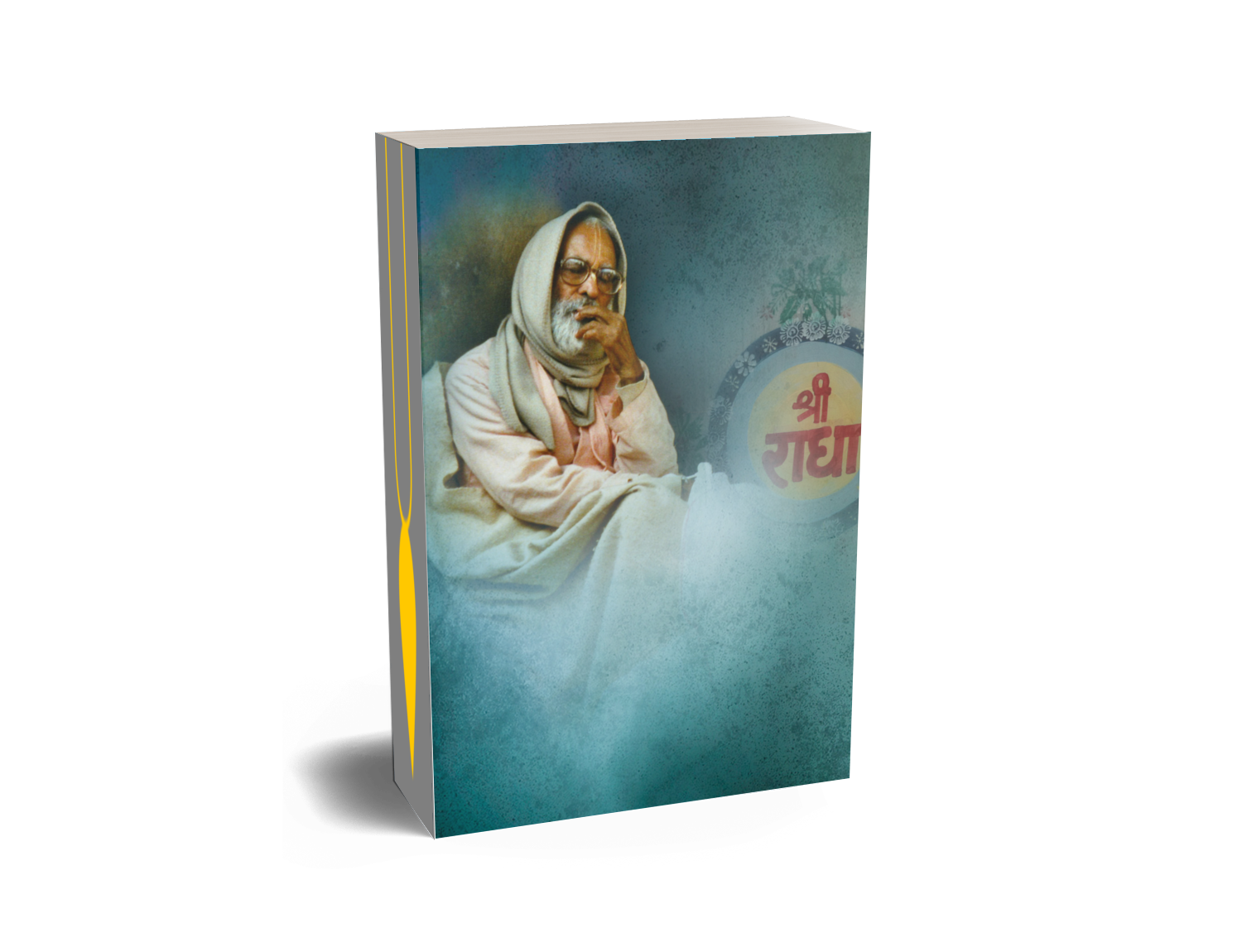

Chapter 5 from the book, The Nectar of Govinda-līlā, 4th edition (Second Printing), by Śrīla Bhaktivedānta Nārāyaṇa Mahārāja
Chapter Five
Niśānta-bhajana
The daily pastimes of Bhagavān are divided into eight parts, and the period from three o’clock in the morning  until the rising of the sun is called niśānta-līlā. It is the end (anta) of the night (niśā). When the living entity begins performing bhajana it is like the rising of the sun. The jīva has been averse to Bhagavān since time immemorial, and due to this mentality he wanders through eighty-four lākhas of species.
until the rising of the sun is called niśānta-līlā. It is the end (anta) of the night (niśā). When the living entity begins performing bhajana it is like the rising of the sun. The jīva has been averse to Bhagavān since time immemorial, and due to this mentality he wanders through eighty-four lākhas of species.
kṛṣṇa bhuli’ sei jīva anādi-bahirmukha
ataeva māyā tāre deya saṁsāra-duḥkha
Śrī Caitanya-caritāmṛta (Madhya-līlā 20.117)
Forgetting Kṛṣṇa, the living entity has been attracted by māyā since time immemorial. Therefore māyā gives him all kinds of misery in his material existence.
kṛṣṇa-bahirmukha hañā bhoga vāñchā kare
nikaṭa-stha māyā tāre jāpaṭiyā dhare
Prema-vivarta
When the living entity becomes averse to Bhagavān, Māyā-devī pounces on him and arrests him.
bhayaṁ dvitīyābhiniveśataḥ syād
īśād apetasya viparyayo ’smṛtiḥ
Śrīmad-Bhāgavatam (11.2.37)
Misunderstanding himself to be a product of the material energy, the living entity becomes overwhelmed with fear. Deceived by māyā, his position becomes reversed – instead of being the servant of Bhagavān, he becomes opposed to Him.
Bhagavān’s Mahāmāyā is of two types: āvaraṇātmikā-māyā, which covers the conditioned soul, and vikṣepātmikā-māyā, which arrests the conditioned soul and casts him into the eighty-four lākhas of species. The first covers the jīva with a material physical body and with a subtle body composed of mind, intelligence and false ego. By identifying himself with these gross material coverings, the internal identity (svarūpa) of the living entity becomes covered. But it is erroneous to think that when Kṛṣṇa comes to this world His svarūpa also  becomes covered. The clouds do not cover the sun, but they can obstruct our vision so that we are unable to see the sun. But if we go up in an aeroplane, we can then see that the sun is actually shining and that the clouds are situated below it. The clouds are limited, whereas the sky is unlimited, and just as the clouds cannot cover the unlimited sky, māyā cannot cover Kṛṣṇa. Where there is Kṛṣṇa, there is no māyā. There, ashamed, she remains standing behind Him and is unable to do anything.
becomes covered. The clouds do not cover the sun, but they can obstruct our vision so that we are unable to see the sun. But if we go up in an aeroplane, we can then see that the sun is actually shining and that the clouds are situated below it. The clouds are limited, whereas the sky is unlimited, and just as the clouds cannot cover the unlimited sky, māyā cannot cover Kṛṣṇa. Where there is Kṛṣṇa, there is no māyā. There, ashamed, she remains standing behind Him and is unable to do anything.
But Bhagavān is so merciful that He descends to the material realm in the form of Paramātmā and is always present in the heart of the jīva as the witness. He watches over us and looks for any pretext to bring us back to Him. He is always there in the heart of the living entity watching and waiting for such a good opportunity. He is very merciful, but not just merciful; He is the intimate friend of the jīva. He knows all about how we can acquire our ultimate good fortune.
When the living entity becomes opposed to Bhagavān and māyā pounces on him, some desires arise in his heart. After fulfilling these desires, he realises that, “All of this is actually not happiness after all.” A baby sees fire, and thinking that it appears very pleasing, gets up to touch it, but his mother says, “If you touch the fire you’ll be burnt.” So she forbids him and takes him in her lap. But he won’t listen and jumps out of her lap to try again, so what will she do then? She grabs his hand and touches it momentarily to the fire, and upon feeling the burning sensation, the baby pulls his hand away. Never again will he go near the fire. In the same way that Bhagavān is very merciful, Māyā-devī is also very merciful. Allowing the jīva to enjoy and helping him to attain what he desires until the jīva realises, “In reality this is poisonous!”, Bhagavān then begins to bring the jīva towards Himself.
heart. After fulfilling these desires, he realises that, “All of this is actually not happiness after all.” A baby sees fire, and thinking that it appears very pleasing, gets up to touch it, but his mother says, “If you touch the fire you’ll be burnt.” So she forbids him and takes him in her lap. But he won’t listen and jumps out of her lap to try again, so what will she do then? She grabs his hand and touches it momentarily to the fire, and upon feeling the burning sensation, the baby pulls his hand away. Never again will he go near the fire. In the same way that Bhagavān is very merciful, Māyā-devī is also very merciful. Allowing the jīva to enjoy and helping him to attain what he desires until the jīva realises, “In reality this is poisonous!”, Bhagavān then begins to bring the jīva towards Himself.
brahmāṇḍa bhramite kona bhāgyavān jīva
guru-kṛṣṇa-prasāde pāya bhakti-latā-bīja
Śrī Caitanya-caritāmṛta (Madhya-līlā 19.151)
It is the immense good fortune of the living entity that Bhagavān comes to him in the forms of guru and Vaiṣṇavas. He sends the guru to him, and sends the Vaiṣṇavas to him, and through them the seed of the creeper of devotion is planted in the jīva’s heart. As long as we do not have this seed of bhakti, for us it is still niśā, night.
yā niśā sarva-bhūtānāṁ
tasyāṁ jāgarti saṁyamī
yasyāṁ jāgrati bhūtāni
sā niśā paśyato muneḥ
Bhagavad-gītā (2.69)
When sādhus and Vaiṣṇavas are awake, it is night for worldly people, and what is day for worldly people is night for the sādhu. Those that have been arrested by māyā are asleep to everything related to Bhagavān, and the sādhus that are awake to Bhagavān are asleep to the enjoying spirit of worldly people. Therefore, for those not engaged in bhajana, it is niśā, night. They are trapped in the night of sense enjoyment. When the night is coming to an end it is called niśānta, and what brings about the end of the conditioned soul’s night?
satāṁ prasaṅgān mama vīrya-saṁvido
bhavanti hṛt-karṇa-rasāyanāḥ kathāḥ
taj-joṣaṇād āśv apavarga-vartmani
śraddhā ratir bhaktir anukramiṣyati
Śrīmad-Bhāgavatam (3.25.25)
In the company of Vaiṣṇavas, hari-kathā is very tasteful to the ears and heart. By this process one progresses very quickly on the devotional path and will attain śraddhā, rati and bhakti in sequence.
What is the first sign that the night of the jīvas’ enjoying spirit is coming to an end? One attains the association of guru and Vaiṣṇavas, and then comes to Vṛndāvana, where day and night hari-kathā is being spoken. So when the conditioned soul meets a real sādhu, who can give causeless mercy, then it appears that the night of his wandering through eighty-four lākhas of species is coming to an end, and daybreak is coming. The darkness of māyā will be dissipated, and this is called niśānta-bhajana.
It is compared to the time when the night is completed and symptoms of daybreak begin to appear. The peacock  makes the ke-kā sound, and the sparrows begin making the chā-chā sound. The birds’ chā-chā sound is like the devotees relishing hari-kathā, and the ke-kā sound indicates that having accepted initiation (dīkṣā) from a spiritual master, the stars that were so luminous during the night – meaning the attraction for sense enjoyment, which until now was shining for the conditioned soul – are no longer visible. The eastern horizon begins to turn red, and now we understand that the night has come to an end, meaning that the conditioned soul’s wandering in the material world will soon come to an end. This is niśānta-bhajana, and is the dawning of śraddhā, faith. And where does this faith come from? The thing which gives śraddhā to the heart of a jīva and moves him in the direction of liberation and bhakti more than anything else is sādhu-saṅga, keeping company with saintly persons. Bhagavān Śrī Kṛṣṇa Himself especially came in the dress of a devotee and went door to door giving the holy name.
makes the ke-kā sound, and the sparrows begin making the chā-chā sound. The birds’ chā-chā sound is like the devotees relishing hari-kathā, and the ke-kā sound indicates that having accepted initiation (dīkṣā) from a spiritual master, the stars that were so luminous during the night – meaning the attraction for sense enjoyment, which until now was shining for the conditioned soul – are no longer visible. The eastern horizon begins to turn red, and now we understand that the night has come to an end, meaning that the conditioned soul’s wandering in the material world will soon come to an end. This is niśānta-bhajana, and is the dawning of śraddhā, faith. And where does this faith come from? The thing which gives śraddhā to the heart of a jīva and moves him in the direction of liberation and bhakti more than anything else is sādhu-saṅga, keeping company with saintly persons. Bhagavān Śrī Kṛṣṇa Himself especially came in the dress of a devotee and went door to door giving the holy name.
yāre dekha, tāre kaha ‘kṛṣṇa’-upadeśa
āmāra ājñāya guru hañā tāra’ ei deśa
Śrī Caitanya-caritāmṛta (Madhya-līlā 7.128)
Tell everyone you meet the instructions of Kṛṣṇa. By My order become a guru and deliver everyone in this land.
Śrī Caitanya Mahāprabhu went from door to door telling the living entities, “I went to My guru and he told Me, ‘Study Vedānta!’ But I said, ‘Gurudeva, I am a big fool. There is no other fool like Me in this world, so how will I study Vedānta? Please be merciful and tell Me an easier method.’
“Then My gurudeva said, ‘Alright. I see that You are unqualified to study Vedānta. Then just remember this verse:
harer nāma harer nāma
harer nāmaiva kevalam
kalau nāsty eva nāsty eva
nāsty eva gatir anyathā
Bṛhan-nāradīya Purāṇa
“‘By chanting the holy name You will attain Your ultimate good. Besides this there is no other way, no other way, no other way.’” Saying it once was not enough – he said it three times. Why? To make our firm faith arise in harināma: “Definitely you will receive your highest good fortune by this!” If he had not said it like this, would we have any faith in the holy name? Besides harināma there is no other way to attain happiness and peace of mind and cross over the ocean of material existence. To make faith arise in the hearts of the living entities, Mahāprabhu has given this verse.
Suppose a man is sleeping. How will you awaken him? By calling him: “Hey, get up!” Similarly, loudly singing nāma-saṅkīrtana acts as a mother who awakens the jīva who is deeply asleep in the night of illusion. And in Kali-yuga, the best of all holy names is the mahā-mantra: Hare Kṛṣṇa, Hare Kṛṣṇa, Kṛṣṇa Kṛṣṇa, Hare Hare; Hare Rāma, Hare Rāma, Rāma Rāma, Hare Hare.
khāite śuite yathā tathā nāma laya
kāla-deśa-niyama nāhi, sarva siddhi haya
Śrī Caitanya-caritāmṛta (Antya-līlā 20.18)
By chanting it at any time or place, even while eating or lying down, the holy name gives all perfection.
When I first joined the mission, a doubt arose in me: “There are no names higher than Rādhā-Kṛṣṇa. Mahāprabhu would go mad by chanting ‘Kṛṣṇa, Kṛṣṇa,’ but in the mahā-mantra the name of Srīmatī Rādhikā is not given in an explicit way. Some chant ‘Rādhe Kṛṣṇa, Rādhe Kṛṣṇa, Kṛṣṇa Kṛṣṇa, Rādhe Rādhe; Rādhe Śyāma, Rādhe Śyāma, Śyāma Śyāma, Rādhe Rādhe.’ What is the harm in that? Śyāma is a more direct name of Kṛṣṇa in Vṛndāvana, and by chanting ‘Hare Kṛṣṇa’ we have to assume that ‘Hare’ means Rādhikā. Also ‘Rāma’ can refer to either the Rāma of Ayodhyā, Saṅkarṣaṇa Rāma or Balarāma. The direct name of Rādhikā is not found in the mahā-mantra.”
Then I went and asked my gurudeva and other Vaiṣṇavas also, but perhaps considering me to be unqualified to understand at that time, they merely said, “The mahā-mantra is cintāmaṇi, touchstone, and included within it is sādhya and sādhana, everything. If you need to know more, read Jaiva-dharma – the answer is there.”
Jaiva-dharma states that there is so much rasa in the mahā-mantra that there is no need to chant any other 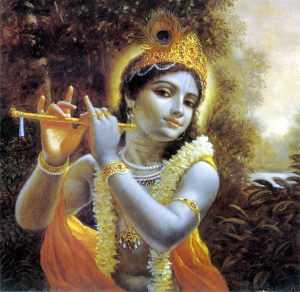 names. Mahāprabhu said, “I had faith in what My gurudeva had said, and I started chanting the holy name. After chanting and chanting, one day I saw that very name personified standing before Me in an attractive threefold-bending posture, attired in the dress of a cowherd boy, playing the flute, smiling and looking in My direction with dancing eyebrows. Through the medium of My eyes, My heart left My body, and laughing, crying and rolling on the ground, I forgot everything.”
names. Mahāprabhu said, “I had faith in what My gurudeva had said, and I started chanting the holy name. After chanting and chanting, one day I saw that very name personified standing before Me in an attractive threefold-bending posture, attired in the dress of a cowherd boy, playing the flute, smiling and looking in My direction with dancing eyebrows. Through the medium of My eyes, My heart left My body, and laughing, crying and rolling on the ground, I forgot everything.”
Prakāśānanda Sarasvatī had asked Mahāprabhu, “Why are You not studying Vedānta? Why are You crying?”
Mahāprabhu replied, “It is this holy name that makes Me sing, dance and cry. In this mahā-mantra there is so much rasa; please just hear the explanation of only one word of it. Hare – what is its meaning? Harati kuñje yāḥ sā rādhikā: Rādhikā enchants Kṛṣṇa’s mind in such a way that it steals Him away to the kuñja. From the word haraṇa, which means “to steal”, comes harā, which becomes hare. Tell Me then – how beautiful is the meaning hidden within it?”
In this way, Mahāprabhu, Rūpa Gosvāmī and Raghunātha dāsa Gosvāmī have extracted this very beautiful meaning from the mahā-mantra. In the indirect form, parokṣavāda, there is so much rasa and ānanda that it is more than what is found in the direct form. In this way they have described the glories of the mahā-mantra as being limitless. The spiritual master, the Vaiṣṇavas and the scriptures make faith in this understanding arise in the heart of the living entity, and this is called niśānta-bhajana.
(2)
Niśānta-bhajana is of two types: one is within the realm of sādhana, and the other is within the realm of perfection, and is rāgānuga-bhajana. In sādhana it is the first stage of bhakti and is compared to the end of the night in Kṛṣṇa’s līlā. In Kṛṣṇa’s pastimes, when night has passed and daybreak is dawning it is called niśānta-līlā. It lasts for three hours – from three o’clock until six o’clock. By the accumulation of devotional merit (sukṛti) we attain sādhu-saṅga, and when the seed of faith is planted within us, it is niśānta-bhajana. And as the word niśā means “night”, here it refers to the darkness of night when the living entity is opposed to Kṛṣṇa.
bhavāpavargo bhramato yadā bhavej
janasya tarhy acyuta sat-samāgamaḥ
Śrīmad-Bhāgavatam (10.51.53)
When the jīva attains saintly association, then this darkness of māyā begins to dissipate and he can understand that his night will soon be ending, meaning that his wandering through countless lifetimes in this material world will soon be finished.
bhaktis tu bhagavad-
bhakta-saṅgena parijāyate
sat-saṅgaḥ prāpyate pumbhiḥ
sukṛtaiḥ pūrva-sañcitaiḥ
Bṛhan-nāradīya Purāṇa 4.33
By the accumulation of sukṛti, one attains sādhu-saṅga, and by sādhu-saṅga one attains bhakti. But as long as one does not have resolute faith in the words of a sādhu, then it will not be real sādhu-saṅga. “I will die before I fail to follow the instructions of the sādhu” – this is the necessary sentiment for performing bhajana.
The kingdom of sādhana-bhajana for the living entity stretches from the beginning stage of śraddhā to the elevated stage of bhāva. In order for śraddhā to arise within a jīva, in the beginning there must be some sukṛti that has been acquired unknowingly. This sukṛti is acquired by unknowingly performing any activity related to Bhagavān or His devotees, and from the influence of this sukṛti one attains saintly association.
The story of Prahlāda Mahārāja illustrates this point. In his previous life he was a brāhmaṇa, and in his youth he was well educated and eventually married. He was adorned with all good qualities and served his parents faithfully. Once while going somewhere, by chance he fell into bad association and became attached to a  prostitute. He became so attached to her that he abandoned the service of his parents, abandoned his wife and children, sold everything in his house and destroyed his household life. Stealthily he had taken whatever possessions he had to this prostitute. Then one day that prostitute saw that she had taken everything from him and that he was now penniless, so she began to ignore him. She would converse with others in his presence, but she would not speak to him and would just tell him to go away. Being very distressed, one morning he left that place and wandered and wandered all day through a jungle and became very hungry and thirsty. Then evening began to fall, and being a winter night, it began to rain. He thought, “Now where will I go?” He was fearing that he might be attacked by a tiger or bear. Then he saw an old, neglected temple, so he entered it and lay down. But the discord with the prostitute was paining him like a thorn in his heart, so he was unable to sleep and all night he just cried and worried.
prostitute. He became so attached to her that he abandoned the service of his parents, abandoned his wife and children, sold everything in his house and destroyed his household life. Stealthily he had taken whatever possessions he had to this prostitute. Then one day that prostitute saw that she had taken everything from him and that he was now penniless, so she began to ignore him. She would converse with others in his presence, but she would not speak to him and would just tell him to go away. Being very distressed, one morning he left that place and wandered and wandered all day through a jungle and became very hungry and thirsty. Then evening began to fall, and being a winter night, it began to rain. He thought, “Now where will I go?” He was fearing that he might be attacked by a tiger or bear. Then he saw an old, neglected temple, so he entered it and lay down. But the discord with the prostitute was paining him like a thorn in his heart, so he was unable to sleep and all night he just cried and worried.
In another place that prostitute had repented and began searching for him. In the night she took shelter in that same temple not knowing that he was also there. She also just cried and cried and was unable to sleep. When the next morning came, they saw each other, and crying, she at once went and fell at his feet. With great affection he embraced her, and the previous incident was forgotten. They returned to their life of misconduct, but at that time no one understood what great benefit they received on that day. That day had happened to be Nṛsiṁha-caturdaśī, the holy appearance day of Lord Nṛsiṁhadeva, and all-day neither of them had drunk any water or eaten anything. They had fasted all day and had also remained awake all night, so they received the 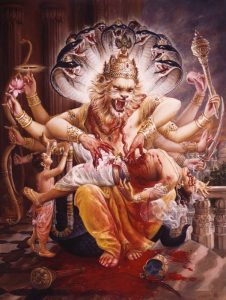 benefit of observing Nṛsiṁha-caturdaśī. And whose temple was it that they had stayed in that night? Nṛsiṁhadeva’s. Unknowingly they received such a great result from this that in his next life he became Prahlāda Mahārāja, and she became his wife.
benefit of observing Nṛsiṁha-caturdaśī. And whose temple was it that they had stayed in that night? Nṛsiṁhadeva’s. Unknowingly they received such a great result from this that in his next life he became Prahlāda Mahārāja, and she became his wife.
From this he attained the opportunity to hear from Nārada. When he was still in his mother’s womb, he heard instructions from Nārada continuously for sixty thousand years. By the mercy of Nārada he became the great spiritual scholar and exclusive devotee of Bhagavān, Prahlāda Mahārāja. This is an example of how sādhu-saṅga is attained as the result of sukṛti, and how bhakti is attained as the result of that sādhu-saṅga.
If even unknowingly someone serves the deity, they will achieve such a great result. Then if someone knowingly constructs a temple for the deity, inaugurates the service of the deity, makes ornaments for the deity, or faithfully serves Vaiṣṇavas and hears spiritual philosophy from them sincerely, how much greater will the result be? So in the kingdom of bhakti this is called niśānta-bhāva and begins with the birth of śraddhā. And that faith will be in what? Not directly in Bhagavān at first, but in the words of the scriptures.
‘śraddhā’-śabde — viśvāsa kahe sudṛḍha niścaya
kṛṣṇe bhakti kaile sarva-karma kṛta haya
Śrī Caitanya-caritāmṛta (Madhya-līlā 22.62)
“If I just perform bhajana of Kṛṣṇa, then everything is accomplished.” Such a high-quality type of faith is called śraddhā. If that śraddhā is placed in the words of the scriptures, in the words of the spiritual master, and in the words of the Vaiṣṇavas, then everything will come from that. “By following whatever they say, everything will be all right. Even if everything in my life is destroyed, then let it be; I will continue executing bhagavad-bhajana” – this is śraddhā, even though there may be anarthas in our bhajana. There is aniṣṭhita-bhakti, unsteady devotion, and niṣṭhita-bhakti, firm devotion. In aniṣṭhita-bhakti, there is false confidence (utsāhamayī ), sporadic endeavour (ghana-taralā), indecision (vyūḍha-vikalpā), delighting in the material facilities that come from bhakti (taraṅga-raṅgiṇī), battling with the desires for sense pleasure (viṣaya-saṅgarā) and the inability to uphold vows (niyamākṣamā). Even though all of these may remain, if one’s faith is of good quality, then upon attaining sādhu-saṅga his internal nature will gradually change. When one understands that upon attaining sādhu-saṅga the night – meaning his conditioned state of existence – will be finished soon, his faith is of good quality.
The end of the night heralds the first of Kṛṣṇa’s pastimes in the daytime. The peacock is sitting in the upper part  of the kadamba tree, and the koel is seated in the upper part of the mango tree. The parrot is seated on a branch of the pomegranate tree, and because his beak is red, he blends in with the redbuds of the tree. The female parrot eats grapes, so she is sitting on the grapevine. All are ready and waiting for Vṛndādevī to give her order, thinking, “When will Vṛndā say?” Seeing that the appropriate time has come, Vṛndādevī gives the order to the birds, “Begin singing!” So they start making the sound kala-rava. What is the meaning of kala-rava? Rava means “sound”, and kala indicates the flute, so this sound tells Kṛṣṇa that it is time to awaken and play the flute. The koel, the hummingbird and the male and female parrots start singing and become so intoxicated by making these musical sounds that it seems Kāmadeva is blowing the conch shell. The male parrot is awakening Kṛṣṇa, and the female parrot is awakening Śrīmatī. The peacock is saying ke, which means “who?” He is referring to Kṛṣṇa, meaning “Who can conquer the great mountain of Rādhikā’s jealous anger, shyness and patience, which no one else can cross over?” By making this sound he is saying, “O Kṛṣṇa, please awaken!” The female peacock is making the kā sound, which also means “who?”, meaning, “Who is it that, even though Her heart is in the form of a seedling, can overpower the mad elephant Kṛṣṇa, who is directly Parabrahma Himself? Rādhikā.” Then everyone awakens and the līlā begins.
of the kadamba tree, and the koel is seated in the upper part of the mango tree. The parrot is seated on a branch of the pomegranate tree, and because his beak is red, he blends in with the redbuds of the tree. The female parrot eats grapes, so she is sitting on the grapevine. All are ready and waiting for Vṛndādevī to give her order, thinking, “When will Vṛndā say?” Seeing that the appropriate time has come, Vṛndādevī gives the order to the birds, “Begin singing!” So they start making the sound kala-rava. What is the meaning of kala-rava? Rava means “sound”, and kala indicates the flute, so this sound tells Kṛṣṇa that it is time to awaken and play the flute. The koel, the hummingbird and the male and female parrots start singing and become so intoxicated by making these musical sounds that it seems Kāmadeva is blowing the conch shell. The male parrot is awakening Kṛṣṇa, and the female parrot is awakening Śrīmatī. The peacock is saying ke, which means “who?” He is referring to Kṛṣṇa, meaning “Who can conquer the great mountain of Rādhikā’s jealous anger, shyness and patience, which no one else can cross over?” By making this sound he is saying, “O Kṛṣṇa, please awaken!” The female peacock is making the kā sound, which also means “who?”, meaning, “Who is it that, even though Her heart is in the form of a seedling, can overpower the mad elephant Kṛṣṇa, who is directly Parabrahma Himself? Rādhikā.” Then everyone awakens and the līlā begins.
In this world millions of jīvas are sleeping, and the kindness of the spiritual master and the Vaiṣṇavas that awakens them is like a fathomless ocean. We see this in the life of Gopa-kumāra, and in the life of Vrajanātha in Jaiva-dharma, and in the lives of so many devotees in Śrīmad-Bhāgavatam. Without the causeless mercy of Bhagavān, no jīva whosoever can be spiritually awakened. Śrīmatī Rādhikā was waiting for Gopa-kumāra to come to Her in Goloka, so She arranged for him to take birth at Govardhana. She gave him the opportunity to daily take the cows out to graze and to wander around Vraja. And She Herself sent his guru Jayanta to him. Finding any pretext, She made a plan to bring him to Her.
In the same way the spiritual master and the Vaiṣṇavas are supremely merciful. If they see that one’s sukṛti is not strong, they somehow arrange that his sukṛti will be strengthened. For those who already have śraddhā, they strengthen their faith by bestowing upon them the gift of their own company. If they see that someone has no desire for bhakti, they arrange for them to hear hari-kathā. A paramahaṁsa Vaiṣṇava – who is qualified to cross the upper limit of the madhyama-adhikāra stage – a topmost Vaiṣṇava who is nindādi-śūnya, free from the tendency to criticise others, will cry and be so upset for us. In the same way that Kṛṣṇa cries and is upset for us, so the spiritual master and the Vaiṣṇavas are so upset for us that we cannot possibly estimate it. The guru and  the Vaiṣṇavas suffer so much for us, just like a mother when she is raising her small child. At night the mother is sleeping, and the baby’s crying awakens her. Then the child passes stool and cries even more. Will the poor woman be able to sleep? She undergoes so much suffering and difficulty in the upbringing of her child, and the father knows little of it. Only the mother can fully know it.
the Vaiṣṇavas suffer so much for us, just like a mother when she is raising her small child. At night the mother is sleeping, and the baby’s crying awakens her. Then the child passes stool and cries even more. Will the poor woman be able to sleep? She undergoes so much suffering and difficulty in the upbringing of her child, and the father knows little of it. Only the mother can fully know it.
Similarly, the spiritual master and the Vaiṣṇavas are supremely merciful. Making different plans they make śraddhā arise in others and then always try to strengthen that faith. Their first duty towards us is to awaken our faith in the holy name, the guru and the Vaiṣṇavas, and this is niśānta-bhajana. If someone is to begin performing bhajana, then for the welfare of their faith they must understand one thing: that Kṛṣṇa is Svayam Bhagavān, and especially that Śrī Caitanya Mahāprabhu is Kṛṣṇa Himself. This must be understood first – that Mahāprabhu gave His everything to the jīvas, whereas Kṛṣṇa did not give as much. Kṛṣṇa came in the form of Mahāprabhu with the bhāva of Rādhikā – what is the meaning? We are not referring here to the three sentiments described in this verse (Śrī Caitanya-caritāmṛta (Ādi-līlā 1.6)):
śrī-rādhāyāḥ praṇaya-mahimā kīdṛśo vānayaivā-
svādyo yenādbhuta-madhurimā kīdṛśo vā madīyaḥ
saukhyaṁ cāsyā mad-anubhavataḥ kīdṛśaṁ veti lobhāt
tad-bhāvāḍhyaḥ samajani śacī-garbha-sindhau harīnduḥ
Desiring to understand the glory of Rādhikā’s love, the wonderful qualities in Him that She alone relishes through Her love, and the happiness She feels when She realises the sweetness of His love, Śrī Hari, richly endowed with Her emotions, appeared from the womb of Śrīmatī Śacī-devī as the moon appears from the ocean.
These three sentiments of Rādhikā can be explained to a new devotee at a later stage. Here the bhāva of Rādhikā that we mean is the sentiment of loving kindness for the living entities. Is this sentiment of mercy found more in Kṛṣṇa or in Rādhikā? More in Rādhikā, and She is the one who, like a mother, nurtures us. Śrīmatī Rādhikā is the one who is the very personification of kindness for us, and Her manifestation in this world is the spiritual master. All of the kindness of Bhagavān is found in the guru.
saṁsāra-dāvānala-līḍha-loka
trāṇāya kāruṇya-ghanāghanatvam
Śrī Gurvaṣṭakam (1)
The spiritual master showers his kindness upon the living entities,
All of Bhagavān’s kindness appears in the forms of the guru and the Vaiṣṇavas. And what instruction do they give first? That Śrī Caitanya Mahāprabhu came as the original guru of Kali-yuga to teach nāma-saṅkīrtana. That He came with the sentiment of a devotee to give bhakti. He didn’t come in the form of Bhagavān; He won’t give bhakti in that form. He will taste it as Bhagavān, but in what form will He give it? As a devotee. Without becoming a devotee, without becoming the āśraya, then how could He give the viṣaya, Kṛṣṇa-prema? Kṛṣṇa is the only real viṣaya of prema in all of existence, so He Himself would be unable to give it. Śrī Rādhā and all other devotees are the āśraya of prema, so they can give it. Therefore Kṛṣṇa Himself came taking the bhāva of Rādhā, here the word bhāva meaning karuṇā, kindness.
anarpita-carīṁ cirāt karuṇayāvatīrṇaḥ kalau
samarpayitum unnatojjvala-rasāṁ sva-bhakti-śriyam
Śrī Caitanya-caritāmṛta (Ādi-līlā 1.4)
With this karuṇa, for the purpose of tasting three sentiments and for giving instruction to the souls of this world, He came. And this is His first instruction:
nāmnām akāri bahudhā nija-sarva-śaktis
tatrārpitā niyamitaḥ smaraṇe na kālaḥ
etādṛśī tava kṛpā bhagavan mamāpi
durdaivam īdṛśam ihājani nānurāgaḥ
Śrī Śikṣāṣṭaka (2)
O Bhagavān, Your name is the giver of all auspiciousness to the jīvas, and therefore, being merciful, You are eternally manifest in the form of names like Rāma, Nārāyaṇa, Mukunda, Mādhava, Govinda, Dāmodara and others. You have invested all of your potency in these names. Being causelessly merciful You have not imposed any restrictions upon the chanting of Your names such as any specified time or place, and therefore they can be chanted at any time of the day or night. O Lord, this is Your causeless mercy upon the living entities, but it is my great misfortune that due to my offences, an attraction for Your name, which is the bestower of all spiritual fruits, has not arisen within me.
This is His first instruction: the holy name is Kṛṣṇa Himself. There is an incident from the time of Narottama dāsa Ṭhākura and Śrīla Lokanātha Gosvāmī concerning this point. Once when Narottama was chanting japa, a farmer  approached him asking for a pail of water. Not understanding the full glories of nāma, the holy name – that it is non-different from nāmī, the possessor of the holy name, in all respects – he put aside his chanting beads to perform this charitable activity. Lokanātha Gosvāmī, knowing that nāma and nāmī are one and the same and that service to the holy name is service to Kṛṣṇa, detected a fault in Narottama Ṭhākura. There is no difference between them. In the stage of practice and in perfection the holy name is Kṛṣṇa.
approached him asking for a pail of water. Not understanding the full glories of nāma, the holy name – that it is non-different from nāmī, the possessor of the holy name, in all respects – he put aside his chanting beads to perform this charitable activity. Lokanātha Gosvāmī, knowing that nāma and nāmī are one and the same and that service to the holy name is service to Kṛṣṇa, detected a fault in Narottama Ṭhākura. There is no difference between them. In the stage of practice and in perfection the holy name is Kṛṣṇa.
Chanting the holy name more and more, Mahāprabhu said, “I saw Kṛṣṇa in the form of Gopāla standing before Me.” The holy name and Kṛṣṇa Himself are non-different, as Mahāprabhu has said in this verse from the Śikṣāṣṭaka. Bhagavān descended as an incarnation in the form of so many names – why? Because there are many different types of people in the world. Their proclivities and faith are of many types. Their previously acquired natures are different, and even in perfection their internal svarūpas are different. Therefore Bhagavān has descended in the forms of many different names. He has so many names like Kṛṣṇa, Nārāyaṇa, Brahman, Paramātmā, Jagannātha, and also Īśvara, Allah, Khudā and God. But we can divide all of these names into two categories: secondary and primary. Names where there is no specification are secondary, like Īśvara. What is the meaning of Īśvara? In this name is there a particular form or shape specified? Just that He is the controller, but 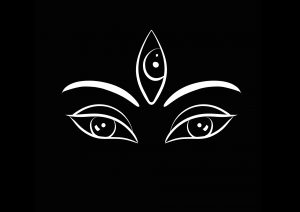 there is no specification. And oṁ can mean Kālī or Gaurī, but does not specify any particular form. And Jagannātha – who does that refer to? All incarnations of Viṣṇu can be called Jagannātha. God is also a secondary name. “G” stands for generator, meaning creator, “o” stands for operator, meaning the one who maintains and nurtures, and “d” stands for destroyer. Allah means He who is the greatest of all, just like our conception of Brahman. It is also a secondary name. Hari means one who steals the consciousness, and is a primary name of Kṛṣṇa. It can also refer to Narahari and Rāmacandra along with Kṛṣṇa – these are the three superior (parāvasthā) incarnations.
there is no specification. And oṁ can mean Kālī or Gaurī, but does not specify any particular form. And Jagannātha – who does that refer to? All incarnations of Viṣṇu can be called Jagannātha. God is also a secondary name. “G” stands for generator, meaning creator, “o” stands for operator, meaning the one who maintains and nurtures, and “d” stands for destroyer. Allah means He who is the greatest of all, just like our conception of Brahman. It is also a secondary name. Hari means one who steals the consciousness, and is a primary name of Kṛṣṇa. It can also refer to Narahari and Rāmacandra along with Kṛṣṇa – these are the three superior (parāvasthā) incarnations.
Nṛsiṁha, Vāmana, Kalki, Rāma, Kṛṣṇa, Nārāyaṇa and Hari are all primary names. Primary names are also of two types. Those names which refer to Bhagavān’s aspect of divine opulence (aiśvarya) are the secondary primary names, and the names of Kṛṣṇa are the main primary names. Then there is some further consideration within the names of Kṛṣṇa. According to the gradation of importance of Kṛṣṇa’s pastimes, there is gradation in His names also. Of the names Rāsa-bihārī and Yaśodā-nandana, which name is more special? Rāsa-bihārī. In this way, within the main primary names are supremely primary names like Rādhānātha, Rādhā-kānta and Gopīnātha. They contain some special potency and indicate a special pastime of Kṛṣṇa. For instance, all of His unique sweetness (mādhurya) is included within the name Rāsa-bihārī, and of all Kṛṣṇa’s pastimes, this name indicates the essence of them. By chanting this name these particular pastimes will be illuminated within the 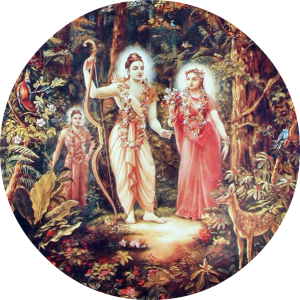 heart of the chanter.
heart of the chanter.
There are different aspects of rāma-nāma. It bestows liberation, and therefore has been called the tāraka-brahma, the sound vibration that helps one cross over māyā. When referring to Dāśarathi Rāma, it means the attractor of the hearts of the jīvas who is supremely merciful and possesses so much special affection (bhakta-vātsalya) for His devotees. This rāma-nāma bestows prema and śānta-rasa, as well as dāsya, sakhya and vātsalya in partial forms. There is no difference between this name and the name of Kṛṣṇa except for some special consideration of rasa. But if Rāma refers to Ramayati Kṛṣṇa or Rādhā-ramaṇa, then it will take one to the highest point.
All of Bhagavān’s potency has been invested in these names – such is His mercy. Who is the first giver of faith? Caitanya Mahāprabhu, and His associates also. And who directly delivers us? Our initiating spiritual master gives us all of this, and our instructing spiritual master (śikṣā-guru) also gives us this. So, first of all, we are indebted to them, and then after them we are indebted to Mahāprabhu and His associates, even though Mahāprabhu was the origin. First we put our faith in the guru, and then we put our faith in Mahāprabhu, because Mahāprabhu will not accept our devotion if we bypass the guru.
Therefore He has said nāmnām akāri bahudhā nija-sarva-śaktis: all of His potencies have been invested within these names, and they differ according to the particular name. And no strict rules have been imposed on the chanting of His names. Suppose someone is seated facing south and saying the gāyatrī-mantra – is this correct, or not? No, because a rule (niyama) has been imposed on chanting gāyatrī. But if someone sits to chant the holy name facing south, will there be any harm? No consideration of time or place has been imposed on the chanting of harināma. Mahāprabhu said that even while eating and resting we should take harināma. Will we sit to chant gāyatrī or to perform arcana with contaminated hands? No, because it will be aparādha, an offence. But sometimes when we sneeze, we say “Hari, Hari”, and when we stumble over something we say “Rāma, Rāma”, and there is no fault in this because in the chanting of the holy name there are no such considerations of time, place or qualification.
If one goes to an unclean place, he will not be able to absorb his mind in spiritual topics by any means. But if he sits in a pure place, like Sevā-kuñja, then very easily he will be able to meditate. There we can discuss these high spiritual topics, but if we go and sit in an unsuitable place, will we be able to discuss things like Rādhikā’s niśānta-līlā? Never. Therefore there are so many sādhanas, and in all of them there is such consideration, but in the chanting of the holy name there is no such consideration of time or place. While eating, lying down, with unclean hands and mouth, or in whatever condition, one can chant harināma. Suppose someone has become  disabled and is unable to sit up. For him will a rule be imposed that he must sit up to chant harināma, and that he cannot chant while lying down? Suppose someone is in the latrine suffering from vomiting and diarrhoea. In that condition he won’t be able to practise meditation, perform austerities, do yoga or anything. Seeing his helpless condition, will we say that he cannot chant the holy name then, and that instead someone will have to come and chant in his ear, “Kṛṣṇa, Kṛṣṇa, Rāma, Rāma”? Even in that condition the result will come from chanting, whereas from any other sādhana there would be no benefit. Therefore first making faith in the holy name arise in someone is niśānta-bhajana, and concerning this Mahāprabhu said:
disabled and is unable to sit up. For him will a rule be imposed that he must sit up to chant harināma, and that he cannot chant while lying down? Suppose someone is in the latrine suffering from vomiting and diarrhoea. In that condition he won’t be able to practise meditation, perform austerities, do yoga or anything. Seeing his helpless condition, will we say that he cannot chant the holy name then, and that instead someone will have to come and chant in his ear, “Kṛṣṇa, Kṛṣṇa, Rāma, Rāma”? Even in that condition the result will come from chanting, whereas from any other sādhana there would be no benefit. Therefore first making faith in the holy name arise in someone is niśānta-bhajana, and concerning this Mahāprabhu said:
harer nāma harer nāma
harer nāmaiva kevalam
kalau nāsty eva nāsty eva
nāsty eva gatir anyathā
There is no other way but chanting of the holy name, but one thing is essential – from where do we hear the glories of the holy name? From the spiritual master and the Vaiṣṇavas. Without first attaining sādhu-saṅga one will not be able to chant the holy name, and even if he does chant, what kind of nāma he is chanting will be questionable. The nāma that we have received from the guru is like a strong seed. From a strong seed a healthy plant will emerge, but a weak seed will produce nothing. Similarly, the spiritual master gives us śabda-brahma, transcendental sound vibration, and taking that harināma will produce the fruit of Kṛṣṇa-prema. But the weak seed, which is not śabda-brahma and which does not have perfection inherent within it, will only produce the fruits of material enjoyment and liberation.
ceto-darpaṇa-mārjanaṁ bhava-mahā-dāvāgni-nirvāpaṇaṁ
śreyaḥ-kairava-candrikā-vitaraṇaṁ vidyā-vadhū-jīvanam
ānandāmbudhi-vardhanaṁ prati-padaṁ pūrṇāmṛtāsvādanaṁ
sarvātma-snapanaṁ paraṁ vijayate śrī-kṛṣṇa-saṇkīrtanam
Śrī Śikṣāṣṭaka (1)
The first effect of the holy name is that it cleanses the mirror of the heart, the second effect is that it extinguishes the fire of misery in the forest of birth and death, the third effect is that like the rays of the moon it causes the flower of the living entities’ ultimate good fortune to bloom, and the fourth effect is that it bestows the innermost transcendental knowledge, which is compared to a young bride. The fifth effect is that it increases the ocean of transcendental pleasure, the sixth effect is that it makes us taste the highest nectar at every step, and the seventh is that it thoroughly cools and purifies us inside and out. These are the seven effects of chanting harināma, and after this it bestows prema, making eight. This gradual awakening beginning with cleansing the mirror of the heart is niśānta-bhajana, and after this, when one meditates with rasika-bhāva on the eight parts of Śrī Kṛṣṇa’s day, direct service to Him is attained.
Image/Art made possible by Pixabay.com & Krishnapath.org








